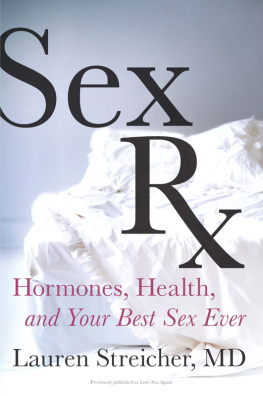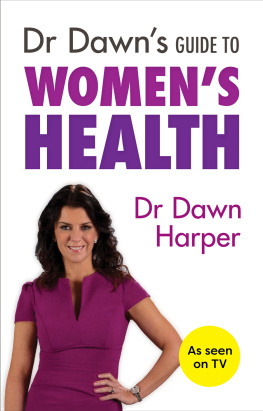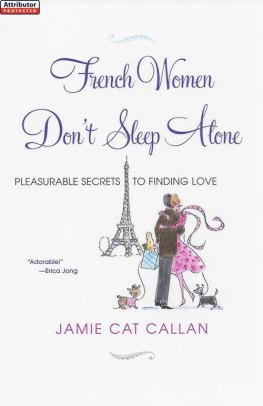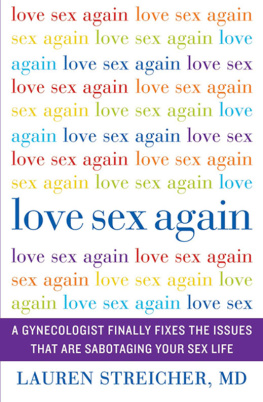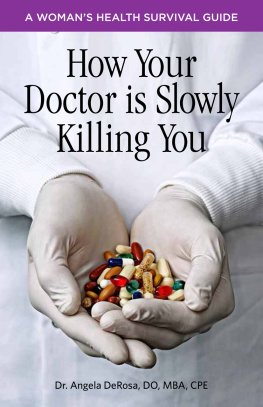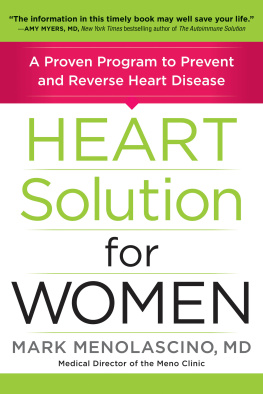The Essential Guide to Hysterectomy:
Advice from a Gynecologist on Your Choices
Before, During, and After Surgery
Whos having sex? Whos not?
And if not, why not?
No one hesitates to say to a friend, I have a cough Im concerned about, Im not sleeping very well lately, or, Im a little worried about my swollen ankles. But when was the last time you admitted to a coworker, My vagina smells funny, or, I have a terrible headache every time I have an orgasm, or, My vulvar itch doesnt go away no matter how many times I get treated for a yeast infection?
Exactly.
And because no one, no one, is talking about her sexual health, you would never know that 40 percent of your friends are likely to have experienced some sexual difficulty. You would think from what is presented in books and magazines, in films and TV shows, on the Internet and billboards, that the whole world is erotically charged and every single person (other than you) is having amazing, passionate sex and earth-shattering orgasms on a daily basis.
Even the postmenopausal character played by Meryl Streep in the movie Hope Springs, despite a sexual hiatus of years, was able to have fantastic sex without so much as a bottle of lubricant in sight. I can pretty much guarantee that every gynecologist (and about half the women) in the audience thought, Really? I dont think so. Just because Meryls characters relationship was suddenly passionate doesnt mean her vagina and clitoris were cooperating.
Painful sex, difficult sex, and the lack of sex have always been at the top of the list of taboo topics for women. Many women cant even comfortably say the word vagina, much less talk about a vagina that is dry, painful, bleeding, or the source of incredible agonyall conditions that make intercourse pretty much out of the question. Even really close girlfriends rarely have the courage to say, Jenny, my vagina has been really dry lately. Hows yours?
Women rarely even talk to their sexual partner or husband about this topic, not just because they are embarrassed, but because of the shame and fear associated with perhaps no longer being perceived as sexy. Indeed, in the 2013 Revive survey of sexual behavior among postmenopausal couples, 53 percent of women experienced at least one sexual problem, an astounding 61 percent hid their symptoms from their partner, and a shocking 73 percent admitted that they silently endured painful intercourse to please their partner. The other 40 percent solved the problem by simply avoiding sex altogether. The majority of women who used a vaginal product had a secret ritual behind a closed door to insert or apply it because they didnt want their partner or husband to know they were not as naturally moist and sexy as when they were twenty.
What is this hiding really about?
Sexual Problems Are Even Taboo in the Doctors Office
In spite of the fact that almost 50 percent of women have sexual issues significant enough to interfere with or put a screeching halt to intercourse and intimacy, few doctors ask about this, and if the topic does come up, many doctors have very little to offer beyond, Relax, Try some lubricant, or even worse, Dont worry, its a natural part of aging. Studies also confirm that it is the rare woman who brings it up to her doctor.
Dr. Streichers SexAbility Survey
Women were asked how often their doctor inquired about their sexual health:
26.2 percent said routinely
31.9 percent said sometimes
41.8 percent said never
My experience is different. Because I am a gynecologist who specializes in sexual health, I see women every day who specifically come to me to get treatment for painful intercourse or a lapse in libido. But even I see plenty of patients who have a hard time spitting out the real reason for their visit.
A typical scenario goes something like this: A patient comes in for her annual visit. Before the exam, we chat about her irregular periods, the occasional hot flash, and her daughters new boyfriend. I generally ask, Whats going on in your sex life?
All too often, the response is, Sex life? I dont have one.
Do you want to talk about it?
She assuredly says, No, thats all right.
So I move on to the breast exam, Pap, and pelvic. Before I leave the room, I ask, Is there anything else youd like to discuss?
Then, with an embarrassed look on her face, she finally brings it up. Is there anything you can do about my lack of libido? I really want my sex life back.
I call this very common moment the hand on the door question. Those questions that womenregardless of their agehave been too uncomfortable, too defeated, to ask earlier.
Every year millions of women make that annual trek to their gynecologists office and usually leave without asking that question, even though it is on a lot of womens minds. That hand on the door question is more often than not the reason the patient came to see me in the first place.
And even though most women are more comfortable discussing their sexual issues with me than with other doctors, I can count on one hand the number of patients who spontaneously tell me that it hurts when they masturbate or they are no longer able to have an orgasm. Sadly, for the majority of women, there is shame in admitting that they self-stimulate, enjoy orgasms, miss orgasms, and would like to have orgasms again.
A lot more is broken here than vaginas.
The whys and why-nots of whos sexually active, whos not, and who cares are incredibly complex. At the risk of oversimplifying, I can say that it almost always comes down to two questions: is there the opportunity, and is there pleasure?
There are really three groups of women:
Women who enjoy a great deal of gratification from self-stimulation and/or partnered sex
Women for whom there is little or no pleasure in sexual activity and for whom sex represents an obligation exclusively for the purpose of procreation and fulfillment of their marital or relationship expectations
Women for whom sex represents intimacy and relationship far more than physical release and for whom the cuddling is great, the act itself is superfluous, and the orgasms are generally absent
I, of course, maintain that all women can and should enjoy sex. But sadly, once a medical barrier presents itself, women who never particularly enjoyed sex are often relieved to have a legitimate excuse to cross intercourse and sexual activity off their to-do list. Being nonsexual becomes the new normal. And women who enjoyed sex, when faced with a medical barrier, are, if not devastated, at a minimum saddened by the loss.
Heres what this book is intended to do: give you the information you need about how your body is working or not working to decide yourself what needs fixing.
Big Pharma to the Rescue?
Nevertheless, our reluctance to talk about sexual health is changing. It used to be that I was one of the few people to talk about problems with vaginas in public (my family is used to it), but now there are ads everywherein magazines, on radio and TV, onlineall touting solutions for sexual pain or low libido. Those ads inevitably have pictures of sad-looking midlife couples lying on opposite sides of the bed.
What is emerging is a push to give women permission to address sexual dysfunction too. Of course, this change is not driven by gynecologists like me who have been trying to start the conversation for years, but by the pharmaceutical industry, which appreciates the magnitude of female sexual dysfunction in women and knows there is a lot of money to make from vaginas that have lost the ability to have pleasurable, slippery intercourse. But because the topic is still a cultural taboo, and the majority of women are not asking for or getting the help they need, companies are now spending millions in marketing dollars to encourage women to talk to their doctors about getting a prescription or, in the case of products that dont require a prescription, go shopping.
Next page
